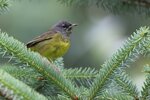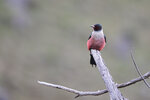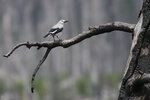


Last month, the American Ornithological Society (AOS), the professional organization responsible for such matters, announced that beginning in 2024 it plans to change the common English names of 70-80 bird species that are named after people (eponyms).
MacGillivray’s Warbler, named by Audubon after a Scottish naturalist friend, is an example of such an eponym. This naming regime was common in the 19th Century when explorers and others were busy collecting specimens of newly “discovered” species and sending them to museums for naming and cataloging - think Lewis’s Woodpecker or Clark’s Nutcracker.
Systematic naming can be traced back to the 18th-century writings of Carl Linnaeus. This Swedish physician and biologist formalized “binominal nomenclature,” the modern system of naming organisms we use today. His first publication was Systema Naturae and it was revolutionary. As developed further by others, it created the taxonomic system by which we organize all biological life. What young dinosaur enthusiast does not know and relish the name Tyrannosaurus rex?
Eponyms in common names have long caused controversy and confusion. Some common names of the 19th century are offensive to modern ears; others commemorate a person of dubious character. Rather than debate these issues one by one, the AOS decided to abandon the eponyms entirely.
“What’s in a name?” is a quote from Shakespeare’s Romeo and Juliet that helps describe the contentious debate that followed the AOU announcement. The “strong feelings” of Montagues and Capulets would not be out of place in these 2023 arguments.
Here is the core reasoning of the AOS, and you can read its entire statement at www.americanornithology.org:
“There is power in a name, and some English bird names have associations with the past that continue to be exclusionary and harmful today. We need a much more inclusive and engaging scientific process that focuses attention on the unique features and beauty of the birds themselves.”
Why is naming so important? It’s really straightforward – it assists us in organizing our thoughts about what we are observing. To accomplish this task, the AOS reasoned, someone who wishes to take up birding should not be burdened with the naming prejudices of the 19th century.
There is little controversy about the taxonomic names that are based on a person’s name because they follow strict rules of precedence and authority and are usually Latinized. For example, MacGillivray’s Warbler was first taxonomically named Geothlypis tolmiei, in honor of William Fraser Tolmie, that same Hudson’s Bay official who served at Fort Nisqually and for whom our local Tolmie State Park is named. Audubon changed only the common name. Small world sometimes.
Some of the objections to the changes are practical. For example, in databases bird species are given 4-letter codes. Cooper’s Hawk becomes COHA. This will require some modifications, similar to what happened a few years ago when our western Winter Wren was separated by the AOS from the eastern Winter Wrens and given a new name, Pacific Wren.
The more vitriolic arguments center around a political position – “woke” culture is invading bird watching! Some argue that, given all the threats to birds (and the planet), the AOS should focus on habitat loss and the like. I’ve been involved in conservation efforts for many decades and learned a basic truth – we will protect what we love. Any actions to make birding accessible to more people of all backgrounds can only lead to a greater love of birds and nature overall.
I’m confident that, in time, we will all get accustomed to the new names and that whatever practical problems develop will be easily managed. And, although I like to sound impressive by rattling off a name like MacGillivray’s Warbler, it ultimately makes no difference to the birds themselves or to my appreciation of their boundless energy, beauty, and song.
George Walter is environmental program manager at the Nisqually Indian Tribe’s natural resources department; he also has a 40+ year interest in bird watching. He may be reached at george@theJOLTnews.com
Photos for this column are provided by Liam Hutcheson, a talented 16-year-old Olympia area birder and avid photographer.
12 comments on this item Please log in to comment by clicking here
FordPrefect
The author’s argument is that “you’ll just get accustomed to the new names” and I’m sure he’s right. What’s disturbing is that he welcomes the Orwellian dulling of language and redaction of history. This year it’s birds and nebulae; turns out Magellan was a bit of a jerk.
Shall we rename our state? Or does George get a pass because he supposedly changed his opinion about slavery over the course of his life?
How will we know when we’ve satisfied the censors?
Thursday, December 28, 2023 Report this
FordPrefect
Jefferson, Grant, Benton and Clark counties are all in trouble. Seattle… oh dear.
Thursday, December 28, 2023 Report this
Callie
I'm ready to be done with Parkinson's Disease, Wilson's Disease, Alzheimer's
Thursday, December 28, 2023 Report this
FordPrefect
Drs. James Parkinson, Samuel Wilson, and Alois Alzheimer all seem to have a clean bill of health according to the current standards of social justice. We should play it safe to be certain we don’t offend someone someday. It’s probably best not to name anything after anyone.
Besides ‘Paralysis agitans’, ‘hepatolenticular degeneration’, and ‘neurocognitive degeneration associated with amyloid plaques, neurofibrillary tangles and loss of neuronal connections’ have such a nice ring to them.
Sarcasm aside, I have a genuine questions for Mr. Walter. These birds are named by or for the people who first described them in western literature. If one were studying COHA, using your example, would they not uncover a broader body of research under the name Cooper’s Hawk? Is the animal’s taxonomic name (Accipiter cooperii) still safe to use? It sure seems like that burdensome 19th century name is still in there.
Friday, December 29, 2023 Report this
FordPrefect
Well shucks, that typo sure doesn’t help my argument. Correction, “I have genuine questions for…”
Friday, December 29, 2023 Report this
Georgewalter
Every writer enjoys receiving comments because it means that someone is reading one's work. But the commentators here seem to have missed the point - perhaps I was not clear. We have to have consistent names for things in order to effectively communicate. The AOS, a group of ornithological professionals, has the responsibility for the common names of birds in North and Central America. It does not name states, counties, rivers, diseases or the like. Just birds.
If, for example, the citizens of Thurston County want to rename their county (Prairie County sounds good to me), it's up to us. AOS will have no say in the matter. Hopefully, if such a change process is initiated, it will include discussion of "what's in a name" and the realization that the name of anything, including our county, is important.
Will we ever know when the renaming process is final? Probably not, but so what? If there's any certain lesson from the bird common name kerfuffle, it's that what was acceptable and benign 150 years ago may be harmful today. The same may occur 150 years in the future.
FordPrefect asks whether avian taxonomic names are going to be "safe" from change (implying, I imagine, that the AOS proposal is a disease that might be catching). I briefly hinted in my column that taxonomic names are subject to different rules and would not be changed. Here are the details.
The International Commission on Zoological Nomenclature (ICZN) is in charge. Taxonomic names are subject to an agreed set of quasi-judicial rules and, if there is a naming dispute, the ICZN arbitrates and resolves the issue. Using these rules, when researchers are convinced that they have discovered a new species, they submit details and a type specimen to their International professional organization for review. They also submit a preferred name, in Latinized form.
The date of this submittal determines the priority of the name submitted. That's the point of my writing about the name Geothlypis tolmiei having precedence. Audubon could only influence the common name of MacGillivray's Warbler, not the taxonomic name, since his submittal came years after the initial description of the species. Official nomenclature is secure from changes except ones that are required by change the professionals understanding of biological placement of the animal (for example, merging or splitting species or subspecies).
Sunday, December 31, 2023 Report this
FordPrefect
Mr. Walker,
Thank you for taking the time to respond. I fully understand that the AOS does not control the naming of towns, counties or states. You wrote in your response, “We have to have consistent names for things in order to effectively communicate.”
We can actually agree on this point. I contend that the path to that consistency would be to keep the original common names regardless of whether they’re allegedly offensive to someone. It might even spur more research into a bird one might find otherwise uninteresting.
My point is twofold:
1. Renaming a bird, despite the bird’s indifference to human eponyms, muddies the waters for those interested in researching a particular species.
2. History is often rich with dichotomy, and understanding the way in which people lived and thought in the past is an invaluable tool for developing a balanced worldview. Beyond the scope of the AOS, altering the language and censoring history is insidious and ultimately destructive. What is allowed to persist is ultimately decided by ideologues who usually have narrow views of reality.
“Who controls the past controls the future. Who controls the present controls the past.” - George Orwell, 1984
Sunday, December 31, 2023 Report this
Terrilovesanimals
I don't care what anyone renames something like a bird, someone will not like it or find it offensive! It also detracts from the person that found or invented it. Oh well, that's the society we live in sadly.
Sunday, December 31, 2023 Report this
PegGerdes
I appreciate this article and perspective a great deal. For all that this action requires a bit of re-learning and re-thinking for me on a few of the bird names I know by heart, I agree wholeheartedly that it makes no difference whatsoever to my deep enjoyment of birds, their swoop and song. Thank you for the excellent explanation, George Walters - much appreciated.
Monday, January 1 Report this
SecondOtter
As a lifelong birder and one who holds a Master Bander's permit, I think this is ridiculous.
And worrisome. The BBL (Bird Banding Lab in Laurel MD) has a century's worth of data on birds, to include birds such as the Cooper's Hawk. Banders, scientists, researchers and birders all use a four letter code for the birds, as noted in another post. COHA is COoper's HAwk. All the data and reams of books, papers, etc, all use the four letter code. Now the AOU wants to change that.
Somehow the AOU has ordained itself the Master of Birds in the US and has suddenly decided that certain bird's names are offensive due to the first person to name them had some glitch in character.
Will the AOU decide that birds that migrate to other countries, for instance, Costa Rica or Canada, insist those sovereign nations must knuckle under? Will the Bahamas researchers work be rejected when they refer to endangered Kirtland's warbler by that name (it winters in the Bahamas).
Having birded for most of my life, I can tell you that not ONCE, not once, did I ever meet a fellow birder or bander who even knew who the heck Cooper was. It DOESN'T matter. I do agree that one bird, newly renamed Long Tailed Duck, was given a pejorative name that the Native American's were said to refer to older women. Yes, that one name DID need to be changed. But all the rest, NO. Leave it be.
The cynic in me whispers that maybe the AOU wants to reap big bucks in having all the bird guides redone, to show their changed names. Can you imagine the money to be made, the AOU saying, your worn out Peterson Guide is verboten, you can only use our official one that oh by the way costs a fortune.
Will the AOU compensate the US Government for having to change the entire database of bird names?
will they go through a century's worth of scientific papers, books, et al?
And who will be responsible for changing the names? Will the Anna's hummingbird be called the "winter hummingbird' or red headed hummingbird or what? Do we get to choose the names?
Some of their names are already stupid. the Prothonotary Warbler has a name that makes no sense here in the US, as it's an Old English term for a lawyer, and no one can pronounce it. I WISH they'd change it. I wrote to them years ago asking them to change the name to Peterson's Warbler, to honor Roger Tory Peterson and they said 'oh that's dumb' but not is so many words.
The Yellow Bellied Sapsucker doesn't have a yellow belly. Only the male has a little dab of yellow just below the neck. The Bristle Thighed Curlew is said to have a few bristles just at the base of the leg, and you need to have the Hubble Telescope to see them. If they want to change names, that's the sort that needs changing.
I will continue to use names such as Cooper's Hawk and Anna's Hummingbird. Until the AOU nazis will arrest me and pillory me.
The AOU is stirring a tempest in a teapot.
Thursday, January 11 Report this
SecondOtter
To add to the tempest-The AOU plans to change the names of birds with surnames such as Cooper's Hawk). If unsaid, still, it seems to me as if they AOU is trying to be politically correct. If they indeed plan to do so, one name must be changed:American, for instance, the American Robin.
America was named after Amerigo Vespucci, one of Christopher Columbus's crew members. When Columbus landed on the island of Hispaniola (now named Haiti/Domican Republic), he and his crew not only infected the island's indigenous population with diseases such as smallpox and syphilis, but they also enslaved several of the people and took them back to Spain. There some of them were sold, and a few were even exhibited in the Madrid zoo.
Shall we then change the name of our country, because our history reeks of slavery, genocide and exploitation?
AOU can't have it both ways. Leave the current names stay. Any new species found may be called something descriptive, but given how we are exterminating every native species at a hellacious clip, I doubt that will happen.
Friday, January 12 Report this
FordPrefect
SecondOtter,
Well argued and thank you for restoring some of my faith in humanity.
Cheers!
Monday, January 15 Report this